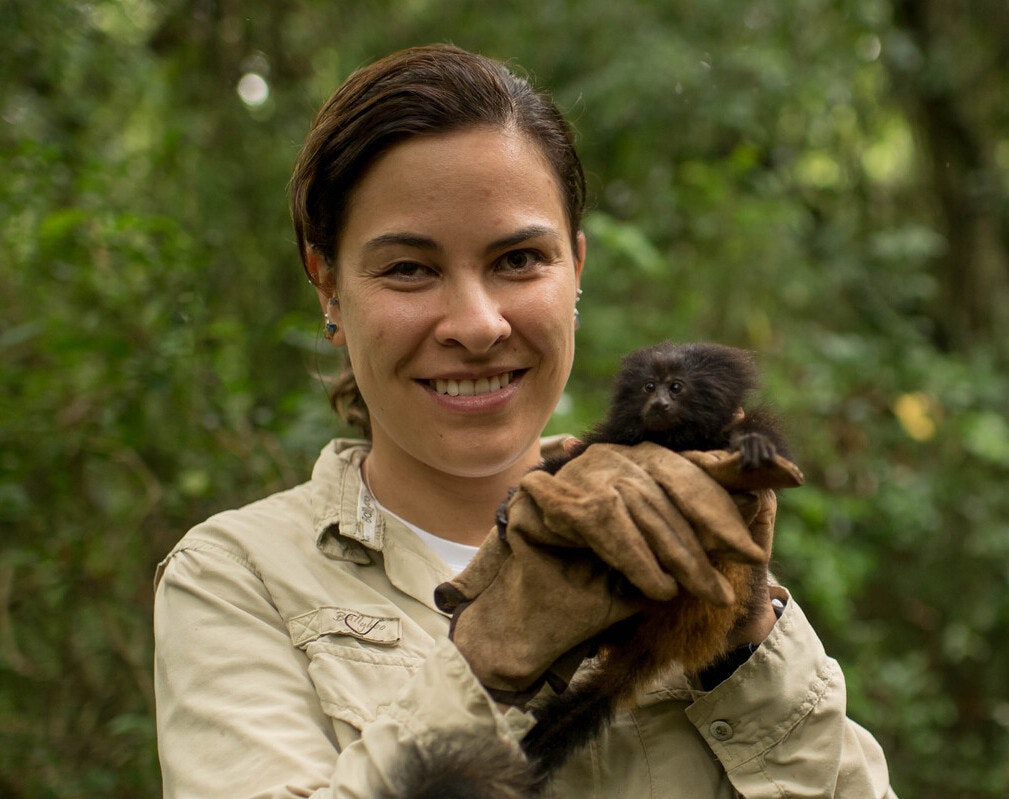FRAGMENTED FORESTS
The Atlantic Forest is one of the last global biodiversity hotspots. It is home to many endemic and endangered species including the black lion tamarin, a small primate found only in the state of São Paulo. The tamarin’s once vast habitat is now highly fragmented, with 80% of the landscape converted to sugar cane plantations and cattle ranches, leaving populations isolated and vulnerable.
SHARED HISTORY
The Black Lion Tamarin Conservation Programme began 35 years ago with primatologist Claudio Padua who won the Whitley Award in 1999, and 2002 winner, Laury Cullen, at the Institute for Ecological Research (IPÊ). For the past nine years, Project Coordinator Gabriela has been working to connect black lion tamarin populations by partnering communities to restore forest corridors and increase landscape connectivity. Their combined work has led to the planting of Brazil’s largest forest corridor and the downlisting of the black lion tamarin to ‘Endangered’ by the IUCN.
CONNECTING CORRIDORS
These primates are safer than they once were, but to ensure the long-term survival of the species, ongoing action is needed. Gabriela will maintain viable tamarin populations by relocating groups to safe fragments to prevent genetic inbreeding and ensure they have the space they need to thrive. She will facilitate local participation in habitat restoration, planting 500 saplings grown in community nurseries to connect forest patches. The project will bring IPÊ one step closer to achieving their overall goal: establishing 45,000 ha of continuous forest.
Gabriela and her team will:
- Relocate black lion tamarin groups to suitable forest fragments as part of an official population management plan
- Engage communities to restore habitat, planting 500 trees in 2020 to help connect wildlife populations
- Install artificial sleeping sites for tamarins in corridors to encourage movement between forest patches
- Reach 40,000 people through education and field experiences, turning students into citizen scientists
TOP FACTs:
- There are estimated to be just 1,600 black lion tamarins left in the wild
- Through tree planting, IPÊ is providing jobs for some of Brazil’s most marginalised communities
- This project helps tackle climate change by protecting and restoring the Atlantic Forest
“I work to restore the natural landscape and to connect people with nature. My hope is to make a better future for my daughter and other Brazilians.” – Gabriela Rezende
Follow Gabriela on social media @institutoipe, and view more photos of her work here.
Image credits: Katie Garrett (headshot, Gabriela & tamarin), Luis Palacios (banner image). Film credits: 3C International, Durrell Wildlife Conservation Trust, Forest Comunicação, Instituto de Pesquisas Ecológicas (IPÊ), Katie Garrett, Laurie Hedges.



